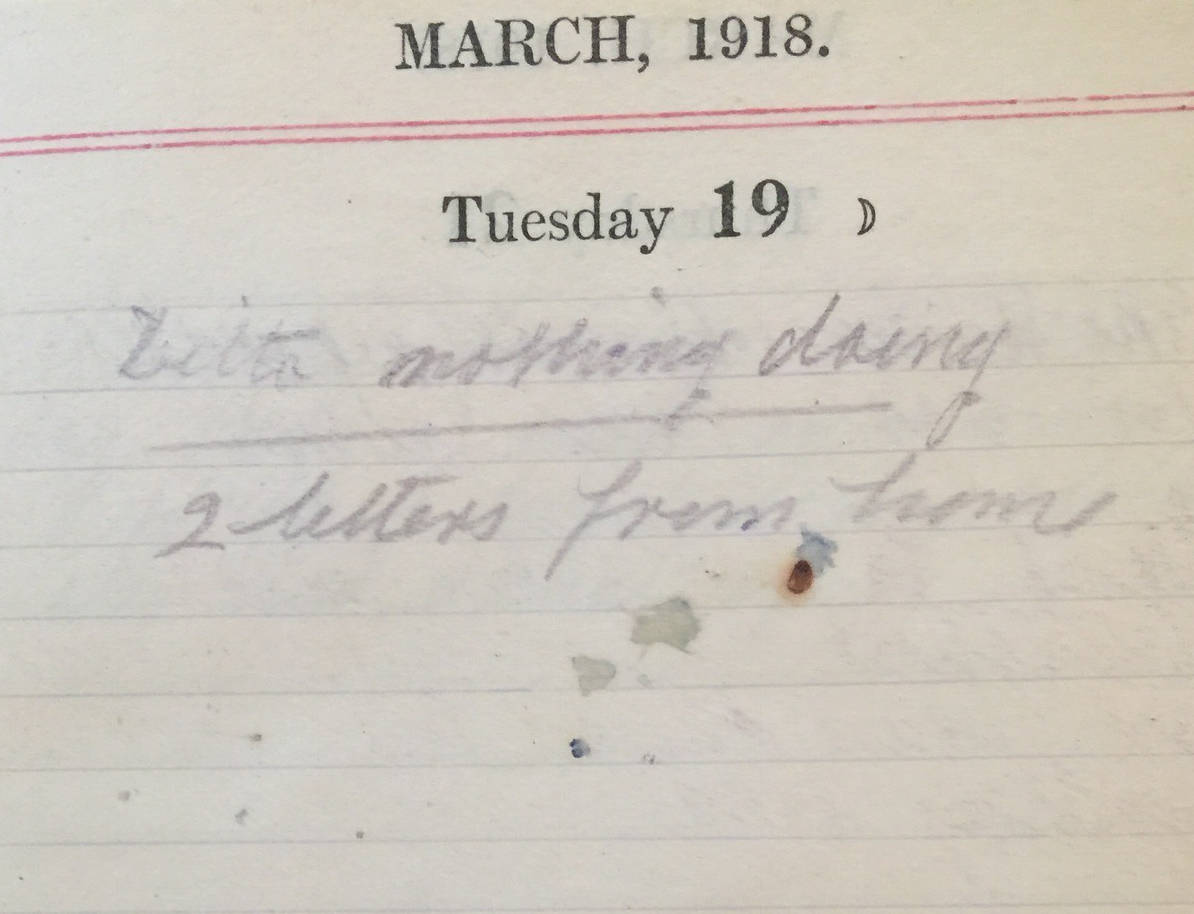Tuesday March 19th, 1918
Ditto nothing doing. Two letters from home.
Scottish Football

A few days ago, I wrote an entry about football aka soccer. However, I started in the middle of the story. Apparently in November 1915, at the height of the furore about the unpatriotic soccer players and their fans, a question was posed in the House of Commons, asking that the government introduce legislation to stop professional football for the duration.
Luckily, thanks to the actions of Edinburgh’s Heart of Midlothian team, the Prime Minister, Herbert Asquith, was able to reject the proposal out of hand. The previous day, 11 Hearts’ players had volunteered for ‘McCrae’s Battalion’ (16th Royal Scots). Like the, soon-to-be-formed English ‘Football Battalion’, the 16th Royal Scots comprised both professional and amateur footballers, many other sports men and hundreds of their fans.¹

Just like their English counterparts, McCrae’s Battalion was to be decimated by war. Having arrived in France in January 1916, they were at the First Battle of the Somme that summer. Led by Sir George McCrae, the Battalion lost 12 officers and 573 men on its first day, more than three-quarters of its attacking strength.
As 2nd Lt James Stevenson poignantly noted, ’1 July marked the end of it all, I was never the same after that day. I never had such friends. And, for a while, I thought I would never smile again.’¹
McCrae himself was invalided home with typhus but the battalion, reconstituted, remained on the Western Front involved in key battles such as those at Arras in 1917 and repulsing Germany’s spring offensive of 1918.¹
Despite many of its leading players becoming casualties, the battalion was amazingly undefeated on the soccer pitches of France throughout the war. Sadly, even troops who made it home, had their health and lives blighted. The long term effects of gas killed many including Bob Mercer, who dropped dead on the Hearts’ pitch in 1926, and Pat Crossan, once the self-declared fastest and handsomest man in Scotland, in 1933.³
Footballs Galore
John McCartney, ex-footballer and wartime manager of Hearts, wrote a very interesting account in 1930 called ‘The Sport in War’. In it he described the Club’s charitable activities during the war. It all seemed to start with a single request for a football and soon snowballed. Over the course of the war, Hearts, supported by the people of Edinburgh, sent 1700 footballs to soldiers on all fronts, including those that were prisoners of war. His book reproduces many comments from both officers and soldiers who received this bounty. The comments run the gamut from those trying to forget the war to others who think sport is key to winning it. Here are a few of them:
‘Lance Crpl Brown ASC Salonica ‘We made a vigorous offensive against a defence without scruples. Finally we discovered that they had twelve men on their side…As we play under the shadow of mighty Olympus, which proves that modern ‘keelies’ are worthy of Hector, Priam and other ancient, Achilles.’ May 1918.’
Private Rutherford, 2nd Canadians ‘Came out of trenches in a snowstorm covered with mud and soaking wet. Your ball proved irresistible and, despite our condition, a hard game was indulged in.’
Rev Alaister J Stewart CF MC (a one-time player for Hearts) writes from Egypt “Football out here is the great cheer up, and it is good to know that football has its part to play in the winning of this War. Those in authority are keen for the men to have plenty of football, and have asked me to act as sort of football ‘impresario’.”²
Bombing Competition
Today the BWD reports that B and D Companies will represent the Battalion at the Bombing Competition. Find out more about Bomb Throwing competition here.
13th (Service) Battalion War Diary – 19th March 1918 – No 1 Sector, Olasli
Training as per programme. As a result of the Bombing Competition D and B Coys will represent the Battalion in the Brigade Bombing Competition. While the Battalion is in the present camp the wearing of SB Respirators will be discontinued. 2 OR struck off effective strength under GRO 1011 with effect from 18-3-18.
References & Further Reading
² ‘The Sport in War’ by John McCartney, published 1930 and reproduced by Andy Mitchell in Scottish Sports History
³ * Article ‘The Team that went to War for Britain’ by Robin Scott-Elliot, August 1st 2014, The Independent


